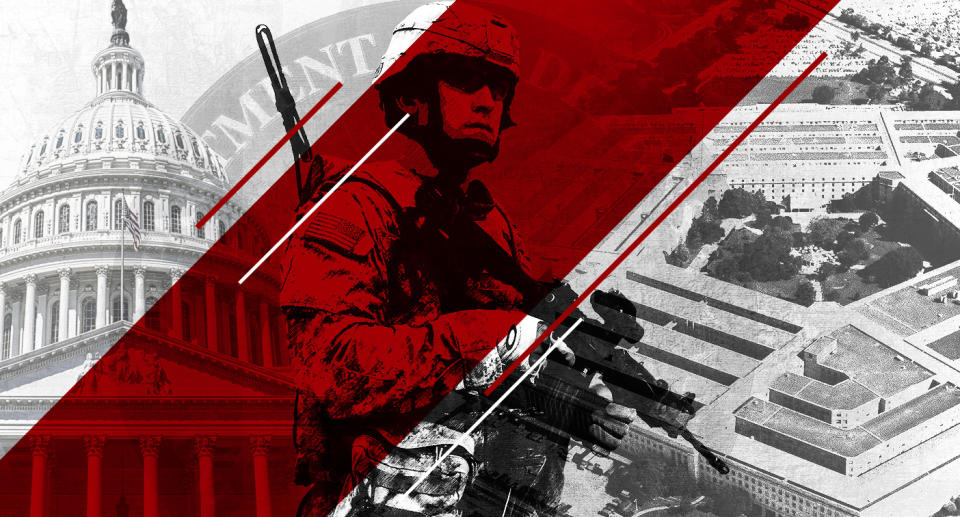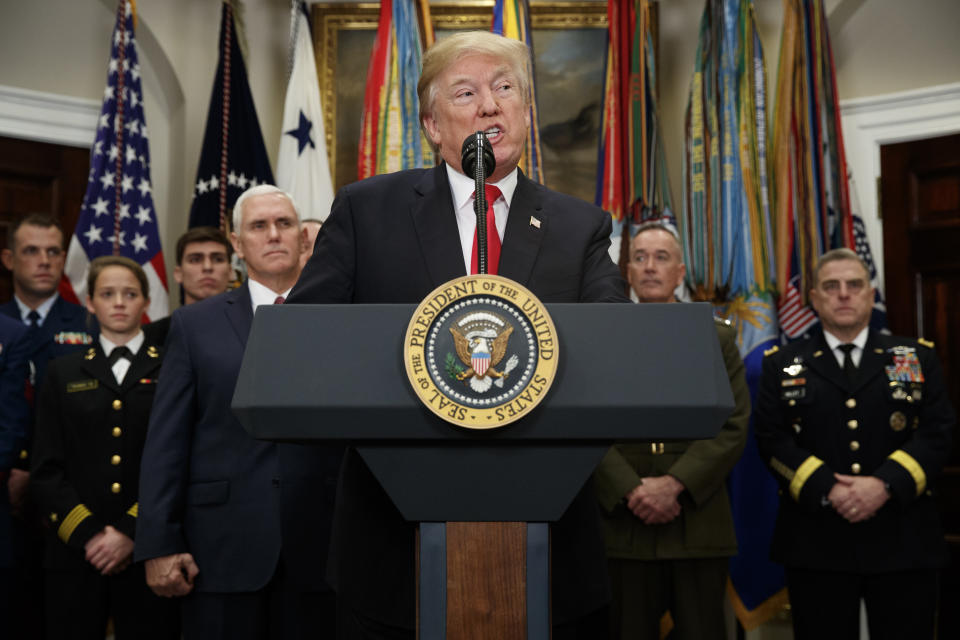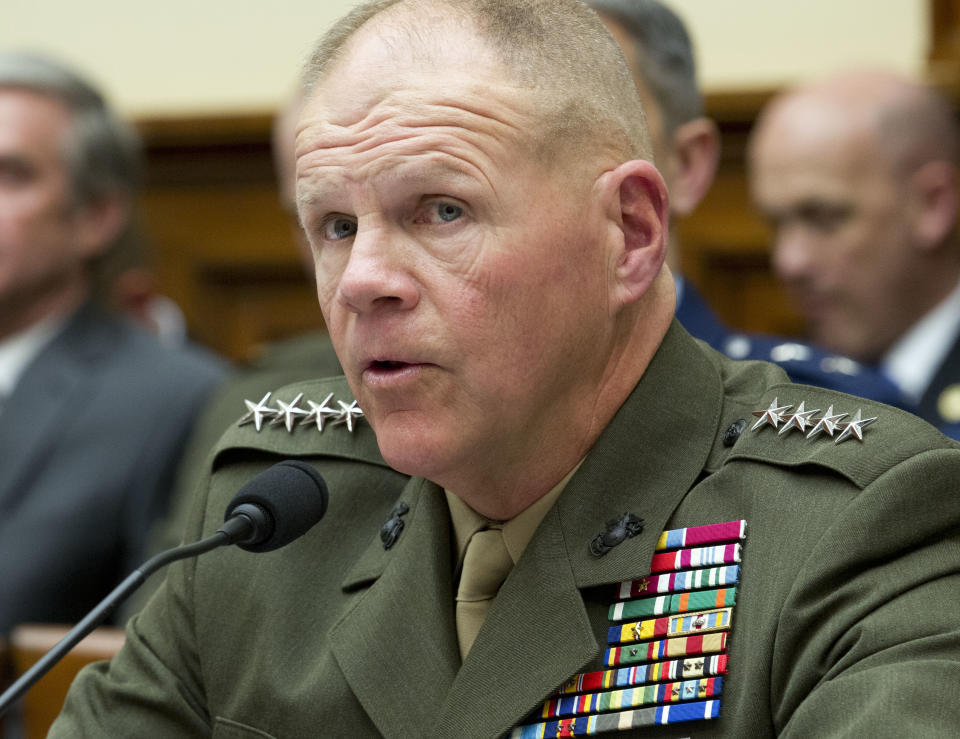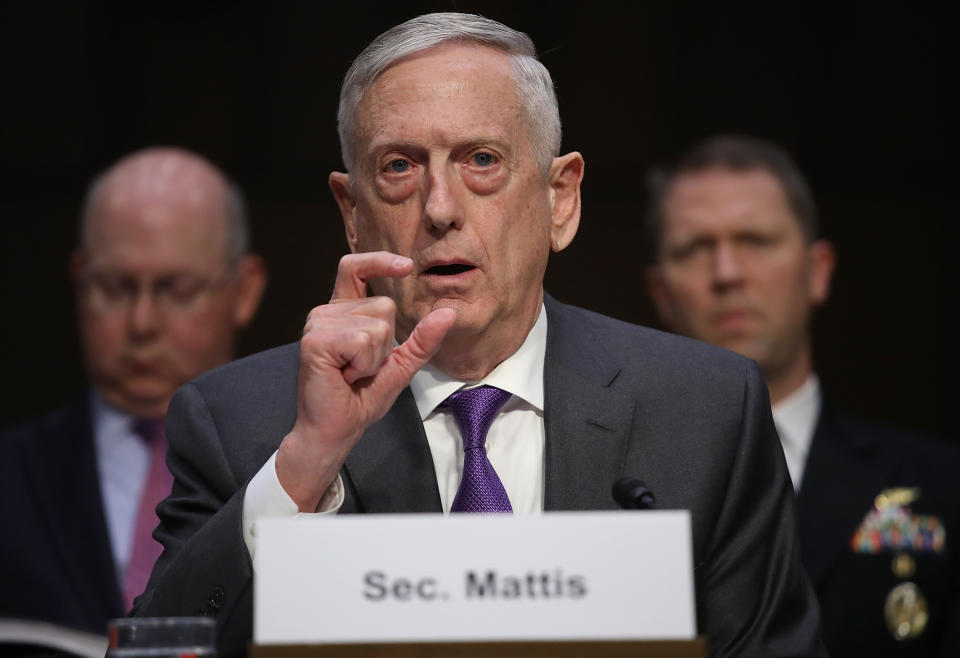Special operations boom years may be coming to a close

Congress and the Pentagon want to rein in and reorient America’s vaunted special operations forces, perhaps relegating them to the supporting roles they played before the attacks of Sept. 11, 2001.
For the past 17 years, special operations forces have been at the forefront of America’s military campaigns in Afghanistan, the Middle East and Africa. They took the lead in toppling the Taliban after the Sept. 11 attacks, reversing the gains of al-Qaida in Iraq, and capturing or killing thousands of militants, from Anwar al-Awlaki in Yemen to Osama bin Laden in Pakistan. During that period, their strength has grown from about 45,000 personnel in 2001 to roughly 70,000, and they are now leading the fight against the Islamic State in Syria and Iraq.
Yet they’ve also suffered setbacks recently, including reports of drug use, the ambush of a special forces team in Niger that raised questions about the scope of missions in that country, and the investigation of two Navy SEALs in connection with the death of a Special Forces soldier in Mali.
Now, Congress and the Pentagon are trying to bring more oversight to special operations forces while reorienting them away from combating militants and toward fighting more traditional nation-states.
Congress made its view clear in this year’s defense authorization bill, which President Trump signed into law on Aug. 13. The Pentagon’s 14-page unclassified summary of this year’s National Defense Strategy does not mention special operations, and says that “inter-state strategic competition, not terrorism, is now the primary concern in U.S. national security.”

The October deaths of four Third Special Forces Group soldiers in the Niger ambush exerted “outsize leverage” on lawmakers’ thinking, according to a congressional staffer.
Indeed, Rep. Adam Smith, D-Wash., the ranking Democrat on the House Armed Services Committee, told attendees at a Defense News Conference Sept. 5 that the ambush was “a good example” of the need for more congressional oversight of special operations forces. “Niger was supposed to be ‘train and equip,’” as opposed to a combat mission, he said. “But in a lot of those places our guys are getting out front … without proper congressional oversight. I think even without proper Pentagon or White House oversight.”
“We need to know where we are engaged in warfare, and in many cases, I think congressional approval should be required,” Smith later told Yahoo News.
The move to assert tighter civilian control over U.S. Special Operations Command (SOCOM), the four-star headquarters in Tampa, Fla., that exercises administrative control of the elite troops, received high marks in some quarters. “SOCOM has eclipsed its senior civilian oversight, and that’s not a good trend at all,” said retired Army Brig. Gen. Don Bolduc, a Special Forces officer who led Africa Command’s special operations component until June 2017. “SOCOM needs to be put in its little box.”
Heaping fewer counterterrorism and counterinsurgency missions on America’s special operators might give them a much-needed respite from the relentless cycle of combat deployments but could also consign the nation’s most elite units to the niche role they held prior to 9/11.
Lawmakers now think the size of the special operations force and the scope of its missions have expanded beyond the ability of U.S. Special Operations Command to handle them, according to close observers. “They believe that SOCOM does not have the management capability to manage the force that the nation has built,” said a former Obama administration official.
Lawmakers’ response has been to strengthen the Pentagon office that oversees special operations forces at the expense of the military headquarters in Florida, in part by requiring SOCOM to transfer funding for about 25 to 30 personnel to that office, which is known as the assistant secretary of defense for special operations and low-intensity conflict.
A congressional staffer said that in the view of Congress, the expansion of special operations forces (SOF) has outgrown SOCOM’s ability to manage it, largely because of the number of missions the Pentagon has placed on the elite troops. “You have SOF being used for everything under the sun, because they’re the supermen of the military,” the staffer said.

Congress’ most recent effort to improve oversight began with the 2017 National Defense Authorization Act, which directed that the assistant secretary become a part of the administrative chain of command for special operations, directly between the defense secretary and the SOCOM commander, and stated that the SOCOM commander’s responsibilities and authorities were now “subject to the authority, direction and control” of the assistant secretary. Together with other changes, the shift in authority made the assistant secretary position more like civilian heads of the Army, Navy and Air Force.
But to the frustration of Congress, the Defense Department was slow to make the changes, arguing that the assistant secretary lacked enough people with the right skills to oversee the special operations community, and that a hiring freeze made it impossible to expand the office. That led to the defense authorization bill requiring that $4 million of SOCOM’s personnel funds be used to pay for additional civilian staff for the assistant secretary. The money will pay for “at least” 25 to 30 people, said a former senior special operations officer.
Critical to these efforts has been the positive impression made on the Senate Armed Services Committee by the current assistant secretary, Owen West, a former Marine officer. “If the committee didn’t have confidence in his ability to do his job well, then they wouldn’t be pushing this as hard,” the congressional staffer said.
But while most observers say Congress is empowering West’s position at SOCOM’s expense, the interpretation of the current SOCOM commander, Army Gen. Tony Thomas, is that making the assistant secretary of special ops more like a service secretary means that his command should be treated more like a service, and the SOCOM commander like a service chief, according to two sources. “He wants to turn SOF into a service,” said Bolduc, adding that he had heard from two people that Thomas had said this at a Dec. 7 meeting Thomas and his staff held with Marine Corps Commandant Gen. Robert Neller and his staff at SOCOM’s headquarters.
“If Thomas could have his way, SOF would become a service, there’d be a service secretary for SOF, he’d be the first chief of staff for SOF,” Bolduc said.

SOCOM spokesman Navy Capt. Jason Salata declined to discuss comments made in a closed forum.
But the congressional staffer said that making the SOCOM commander more like a service chief is not what lawmakers intend. “I have never heard anybody on the professional [committee] staff or any staffers from the personal offices say that,” the staffer said.
The bill also calls for West to conduct “a comprehensive review” of SOCOM to ensure that special operations forces are prepared to counter future threats. The review represents the start of the effort to reorient special operations forces away from the counterterrorism and counterinsurgency missions against jihadist militants that have dominated the national security discussion since 9/11, and to refocus them on threat countries like Russia, China, North Korea and Iran, said the congressional staffer.
“The Department of Defense and Congress may be moving in a direction that slashes special operations resources towards counterterrorism because the focus, as the National Defense Strategy outlines, is on state-based competitors,” said Seth Jones, director of the transnational threats project at the Center for Strategic and International Studies.
The challenge for policymakers is to find the right balance between the continuing missions against groups like the Islamic State and the Taliban, on the one hand, and irregular warfare against nation-states, because the former isn’t going away. There are still “pretty reasonable levels of jihadists operating in Iraq, and Syria, Afghanistan, Libya, Somalia [and] Yemen,” as well as Iranian proxy forces like Lebanese Hezbollah, Jones said, adding that he would be concerned if the government slashed special operations and intelligence resources devoted to those problems. “This is way too early to be declaring victory,” Jones said.
But lawmakers are increasingly aware that special operations forces are overburdened, said the congressional staffer. “Congress has a pretty good understanding that SOF writ large has been used way beyond its capacity and probably beyond its intended job responsibilities,” the staffer said, adding that a lot of special operations missions could be done by U.S. conventional troops or local forces.
“People are starting to think about how do we more judiciously employ SOF and are there some missions that SOF is currently doing that somebody else could do, or that maybe don’t need to be done,” the staffer said.
“You can’t have it both ways,” said a retired special operations officer who retains access to special ops commanders and staff officers. “You can’t have rested and refreshed, highly competent and highly trained troops, if all the time they’re looking at six months later going back to the sandbox.”

Some special operations units are quickly coming to terms with the notion that the priority of their counterterrorism mission may be slipping, according to Jonathan Schroden, director of the special operations program at CNA, a nonprofit research and analysis organization. CNA is helping them “think about what role they might play in [non-counterterrorism] settings,” he said.
Senior special operators are concerned that if they cling too tightly to the type of mission they have been doing since 9/11, they will lose relevance as that threat recedes in importance, according to Schroden. He said a senior special operator had recently told him that “they really worry about SOF becoming to counterterrorism what Kodak was to wet film.”
The past 17 years of counterterrorism-focused special operations is, in fact, “very much an anomaly,” said the former Obama administration official. “It’s not going to stop existing tomorrow, but at the same time it’s not as existential as it once was.”
It falls to Defense Secretary James Mattis to balance the competing demands on special operations forces. So far, he has “been pretty direct” that while he expects special operations forces to contribute to the military’s shift towards preparing for nation-state conflict, he also wants them to “maintain a pretty hefty focus” on counterterrorism, a former senior special operations officer said. Counterterrorism missions in Africa, for instance, “help us maintain influence with those countries,” he said. “It’s a balancing act. We’re not going to wholesale drop the counterterrorism fight. It’ll be marginal changes.”
Other observers said a more dramatic shift may be in the offing. “There’s an attempt here by Congress to look at the larger picture,” Bolduc said. “SOF has just become too defined by counterterrorism over the last 17 years and less defined over where it can really make an impact, and that is train and equip, advise and assist, civil-military information operations.”
One of the more forceful proponents of a shift away from counterterrorism, according to multiple sources, is chairman of the Joint Chiefs of Staff Marine Gen. Joseph Dunford Jr., who is “looking to make dramatic reductions in our [counterterrorism] efforts” in some regions, said the former senior special operations officer.

One such region is Africa, where Dunford’s wishes have been reflected in planned reductions to the special operations posture, the former senior special operations officer added. (Air Force Col. Patrick Ryder, a spokesman for Dunford, said that while the Pentagon was “reviewing plans, operations, and military investments across the globe” in light of the National Defense Strategy, “there has been no direction at this time to adjust forces operating in any combatant command.”)
Reorienting special operations forces to focus primarily against nation-states would mean mixing training for niche tasks in high-intensity conflicts — raiding Iranian or North Korean nuclear facilities, for instance — with preparing for irregular warfare operations such as partisan missions behind enemy lines in the event of a Russian invasion of a NATO ally. “State actors almost certainly are going to focus more on irregular warfare because the costs of conventional or nuclear war against the United States are going to be staggering,” Jones said. “If you’re the Russians and the Iranians, for example, your primary method of competing is almost certainly going to be irregular warfare.”
The renewed focus on nation-state threats might also mean that special operations forces play a less prominent part in future conflicts. “In the post-counterterrorism world, the role of SOF may be shifting from the tip of the spear to merely the supporting entity to conventional forces,” Jones said.
It doesn’t help SOCOM’s cause that neither the defense secretary nor the Joint Chiefs chairman is viewed in some quarters as a big proponent of special operations forces. “General Dunford and the secretary, they’re old Marines and they don’t really care much for special operations,” said the former senior special operations officer. Ryder, Dunford’s spokesman, strongly rejected this description. “Gen. Dunford has always had a great deal of admiration and respect for the unique skills, capabilities and experience our Special Operations Forces bring to the fight every day around the globe,” he said. “Any suggestion to the contrary is absolutely false and misinformed.”
A Pentagon spokesperson did not directly address questions about Mattis’s view of special operations, and instead pointed to the National Security Strategy and the National Defense Strategy.

By shifting SOCOM’s focus and directing a review of roles and missions, Congress is also attempting to alleviate the organizational and personal stress the force is under. “There is a distinct feeling that the SOCOM folks are getting grossly overreached and overused,” said a retired special operations officer. “There are real human costs to that,” said the congressional staffer.
Concerns about the effects of 17 years of war on special operations forces were one factor behind language in the defense bill requiring the defense secretary to conduct “a comprehensive review” of the professionalism and ethics of special operations forces, said a former senior special operations officer. The other factor was a series of high-profile disciplinary episodes that caused lawmakers to question whether there was “an issue with SOF culture” such that special operators “don’t feel like they have to play by the rules,” the former senior special operations officer said.
These incidents include the drug issues that bedeviled East Coast Navy SEAL units earlier this year and the June 2017 death of Army Special Forces Staff Sgt. Logan Melgar in Mali, for which two SEAL Team 6 operators are being investigated, he said.
Because special operations personnel go through such arduous assessment and selection processes, and are given missions of outsize responsibility, more is expected of them.
“They’re a more mature force [and] they work in austere locations, frequently without direct oversight, and so they need to be ethically sound,” said the former Obama administration official, adding that he saw no downsides to conducting the review.
“Only good can come out of that,” he said.
_____
Read more from Yahoo News:


